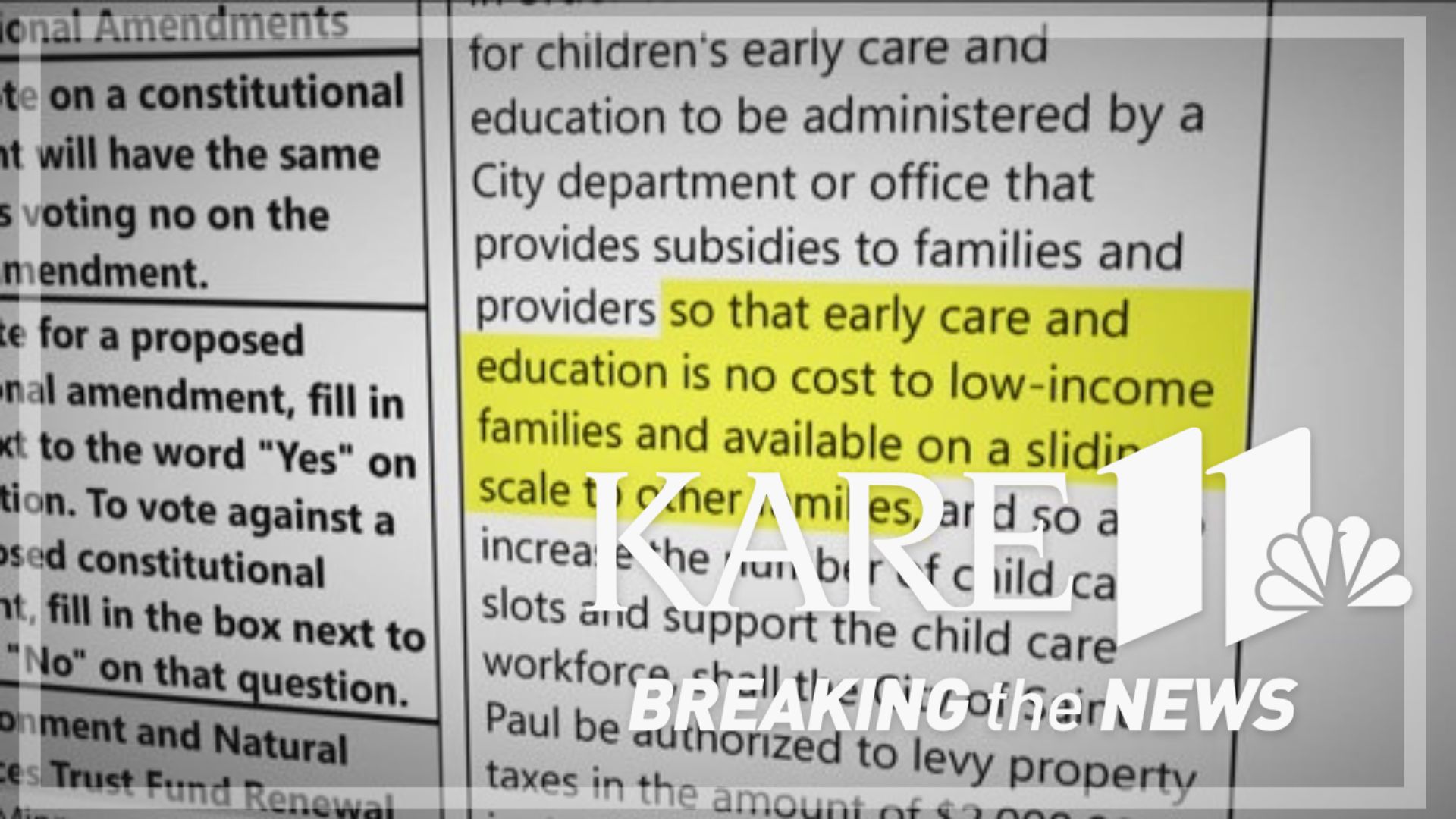ST PAUL, Minn. — A ballot question up for consideration in St. Paul right now would authorize the city to raise property taxes by $110 million over the next ten years in order to help pay for childcare for some low-income families.
But regardless of how that vote goes, Mayor Melvin Carter said he has no plans to follow through.
"I am telling our community that, based on my judgment, it can't be done, so we'll continue to do the work that we've been doing," Carter said. "If our voters say yes to this, they'll say yes to authorizing us, not directing it to be done. Those two things are actually opposites."
St. Paul city council member, Rebecca Noecker, who supports and helped craft the 2024 Early Care and Learning Proposal, said the Mayor's stance is concerning.
"I find it very alarming to hear an elected leader in a democracy say that he would not accept the results of an election," she said. "That's just, that's really concerning from a democracy standpoint to me."
The mayor's argument for ignoring a voter-authorized tax hike centers on the language of the ballot question itself, which reads:
“In order to create a dedicated fund for children's early care and education to be administered by a City department or office that provides subsidies to families and providers so that early care and education is no cost to low-income families and available on a sliding scale to other families, and so as to increase the number of child care slots and support the child care workforce, shall the City of Saint Paul be authorized to levy property taxes in the amount of $2,000,000 in the first year, to increase by the same amount each year following for the next nine years ($4,000,000 of property taxes levied in year two, $6,000,000 in year three, $8,000,000 in year four and so on until $20,000,000 of property taxes are levied in year ten).”
"If I'm a voter, I think, if we vote yes on this, then childcare will be available in the city at no cost to low-income families," Carter said. "This proposal would serve an average of only 404 children per year, at a total cost of $110 million in property tax increases."
"We can't ask (St. Paul voters) to pass the largest single property tax increase that I can ever remember on the basis of making a promise that explicitly says all children, and then turn around and say, 'Oh, of the 20,000 children in our city under age five, we only meant 404 of them."
The mayor isn't the only one who has been clear about their stance for more than a year.
Advocates for the ballot question say they have been clear about who is - and isn't - covered by the proposal since the council voted to override his veto.
"There's never been a claim that this would cover every single child on day one," Noecker told KARE11 back in the summer of 2023. "This is to provide low-income families with free child care, and to make it more affordable for families above that."
Even though the proposal doesn't come close to covering all low-income families, she stands by the language on the ballot and the information that supports it.
"Even if this does move forward, there's just no scenario in which the city can administer this program as it's currently framed," Mayor Carter said during a news conference in the summer of 2023.
"I think that the ballot question is really clear as to who is going to be eligible for the program. But I think that in any ballot question, you only have so many words and so much space, and that's why it's so important to have accompanying information that goes along with that ballot question," Noecker said. "This program will not meet the entire need. And that's, that's the case with every single public program that we have in our country."
Despite her concern with the Mayor's latest comments, Noecker said she remains hopeful that voters will be given the ultimate say.
"I haven't really contemplated what happens after Nov. 5 if the mayor is not ready to respect the results of the election," she said. "That's something that my council colleagues and I will need to talk about and we'll need to discuss what our options are in that situation."
If it does pass, Mayor Carter said he's not the only one who will have questions to answer.
"The folks who put this plan together by ignoring every concern, by ignoring everything my team and I have brought forward, those are the folks who should tell us what they plan to do if this passes," Carter said. "The council member seems to have, essentially at this point, a two-part plan number one is ignoring all of my input and number two is counting on me to do all the work and they're going to need a better plan than that."

